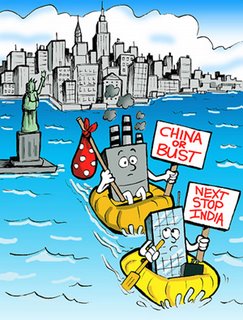JOBS AND GLOBILIZATION
 Will Your JoB Survive?
Will Your JoB Survive?
Harold Meyerson over at WaPo says the the key is reducing outsourcing, promoting unionization, specialization and vocational education.
By Harold MeyersonWednesday, March 22, 2006
In case you've been worrying about how the war in Iraq will end, or the coming of avian flu, or the extinction of the universe as we drift into the cosmic void, well, relax. Here's something you should really fret about: the future of the U.S. economy in the age of globalization. For a discussion of same, let me call your attention to an article in the March-April issue of Foreign Affairs by Princeton University economist Alan Blinder. The vice chairman of the Federal Reserve's board of governors from 1994 to 1996, Blinder is the most mainstream of economists, which makes his squawk of alarm all the more jarring. But the man has crunched the numbers, and what he's found is sure to induce queasiness. In the new global order, Blinder writes, not just manufacturing jobs but a large number of service jobs will be performed in cheaper climes. Indeed, only hands-on or face-to-face services look safe. "Janitors and crane operators are probably immune to foreign competition," Blinder writes, "accountants and computer programmers are not." There follow some back-of-the-envelope calculations as Blinder totes up the number of jobs in tradable and non-tradable sectors. Then comes his (necessarily imprecise) bottom line: "The total number of current U.S. service-sector jobs that will be susceptible to offshoring in the electronic future is two to three times the total number of current manufacturing jobs (which is about 14 million)." As Blinder believes that all those manufacturing jobs are offshorable, too, the grand total of American jobs that could be bound for Bangalore or Bangladesh is somewhere between 42 million and 56 million. That doesn't mean all those jobs are going to be exported. It does mean that the Americans performing them will be in competition with people who will do the same work for a whole lot less. The threat of globalization and the reality of de-unionization have combined to make the raise, for most Americans, a thing of the past. Between 2001 and 2004, median household income inched up by a meager 1.6 percent, even as productivity was expanding at a robust 11.7 percent. The broadly shared prosperity that characterized our economy in the three decades following World War II is now dead as a dodo. Also dying, if not yet also kaput, is the comforting notion that a good education is the best defense against the ravages of globalization -- or, as Bill Clinton famously put it: What you earn is the result of what you learn. A study last year by economists J. Bradford Jensen of the Institute for International Economics and Lori Kletzer of the University of California at Santa Cruz demonstrates that it's the more highly skilled service-sector workers who are likely to have tradable jobs. And according to the Bureau of Labor Statistics, the proportion of jobs in the United States that require a college degree will rise by a measly one percentage point -- from 26.9 percent in 2002 to 27.9 percent in 2012 -- during this decade. Since education as such won't save us, Blinder recommends a kind of particularized vocational ed. We will have to specialize more, he writes, "in the delivery of services where personal presence is either imperative or highly beneficial. Thus, the U.S. workforce of the future will likely have more divorce lawyers and fewer attorneys who write routine contracts." Now, there's a prospect to galvanize a nation. My own sense (which I develop at greater length in the April issue of the American Prospect) is that nothing short of a radical reordering of our economy will suffice if we're to save our beleaguered middle-class majority. Every other advanced economy -- certainly, those of the Europeans and the Japanese -- has a conscious strategy to keep its most highly skilled jobs at home. We have none; American capitalism, dominated by our financial sector, is uniquely wedded to disaggregating companies, thwarting unionization campaigns and offshoring work in a ceaseless campaign to impress investors that it has found the cheapest labor imaginable.
So, here are three immodest suggestions:
· We need to entice industry to invest at home by having the government and our public- and union-controlled pension funds upgrade the infrastructure and invest in energy efficiency and worker training.
· We need to unionize and upgrade the skills of the nearly 50 million private-sector workers in health care, transportation, construction, retail, restaurants and the like whose jobs can't be shipped abroad.
· And, if America is to survive American capitalism in the age of globalization, we need to alter the composition of our corporate boards so that employee and public representatives can limit the offshoring of our economy.
That failing, here come more divorce lawyers.






0 Comments:
Post a Comment
<< Home